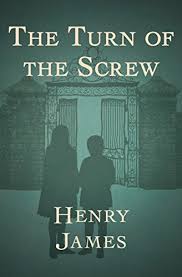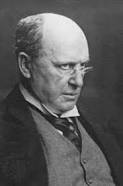The Turn of the Screw Page #9
The Turn of the Screw is an 1898 horror novella by Henry James that first appeared in serial format in Collier's Weekly magazine. In October 1898 it appeared in The Two Magics, a book published by Macmillan in New York City and Heinemann in London.
Her hand tightened. “What was it?” “An extraordinary man. Looking in.” “What extraordinary man?” “I haven’t the least idea.” Mrs. Grose gazed round us in vain. “Then where is he gone?” “I know still less.” “Have you seen him before?” “Yes—once. On the old tower.” She could only look at me harder. “Do you mean he’s a stranger?” “Oh, very much!” “Yet you didn’t tell me?” “No—for reasons. But now that you’ve guessed—” Mrs. Grose’s round eyes encountered this charge. “Ah, I haven’t guessed!” she said very simply. “How can I if you don’t imagine?” “I don’t in the very least.” “You’ve seen him nowhere but on the tower?” “And on this spot just now.” Mrs. Grose looked round again. “What was he doing on the tower?” “Only standing there and looking down at me.” She thought a minute. “Was he a gentleman?” I found I had no need to think. “No.” She gazed in deeper wonder. “No.” “Then nobody about the place? Nobody from the village?” “Nobody—nobody. I didn’t tell you, but I made sure.” She breathed a vague relief: this was, oddly, so much to the good. It only went indeed a little way. “But if he isn’t a gentleman—” “What is he? He’s a horror.” “A horror?” “He’s—God help me if I know what he is!” Mrs. Grose looked round once more; she fixed her eyes on the duskier distance, then, pulling herself together, turned to me with abrupt inconsequence. “It’s time we should be at church.” “Oh, I’m not fit for church!” “Won’t it do you good?” “It won’t do them!— I nodded at the house. “The children?” “I can’t leave them now.” “You’re afraid—?” I spoke boldly. “I’m afraid of him.” Mrs. Grose’s large face showed me, at this, for the first time, the faraway faint glimmer of a consciousness more acute: I somehow made out in it the delayed dawn of an idea I myself had not given her and that was as yet quite obscure to me. It comes back to me that I thought instantly of this as something I could get from her; and I felt it to be connected with the desire she presently showed to know more. “When was it—on the tower?” “About the middle of the month. At this same hour.” “Almost at dark,” said Mrs. Grose. “Oh, no, not nearly. I saw him as I see you.” “Then how did he get in?” “And how did he get out?” I laughed. “I had no opportunity to ask him! This evening, you see,” I pursued, “he has not been able to get in.” “He only peeps?” “I hope it will be confined to that!” She had now let go my hand; she turned away a little. I waited an instant; then I brought out: “Go to church. Goodbye. I must watch.” Slowly she faced me again. “Do you fear for them?” We met in another long look. “Don’t you?” Instead of answering she came nearer to the window and, for a minute, applied her face to the glass. “You see how he could see,” I meanwhile went on. She didn’t move. “How long was he here?” “Till I came out. I came to meet him.” Mrs. Grose at last turned round, and there was still more in her face. “I couldn’t have come out.” “Neither could I!” I laughed again. “But I did come. I have my duty.” “So have I mine,” she replied; after which she added: “What is he like?” “I’ve been dying to tell you. But he’s like nobody.” “Nobody?” she echoed. “He has no hat.” Then seeing in her face that she already, in this, with a deeper dismay, found a touch of picture, I quickly added stroke to stroke. “He has red hair, very red, close-curling, and a pale face, long in shape, with straight, good features and little, rather queer whiskers that are as red as his hair. His eyebrows are, somehow, darker; they look particularly arched and as if they might move a good deal. His eyes are sharp, strange—awfully; but I only know clearly that they’re rather small and very fixed. His mouth’s wide, and his lips are thin, and except for his little whiskers he’s quite clean-shaven. He gives me a sort of sense of looking like an actor.” “An actor!” It was impossible to resemble one less, at least, than Mrs. Grose at that moment. “I’ve never seen one, but so I suppose them. He’s tall, active, erect,” I continued, “but never—no, never!—a gentleman.” My companion’s face had blanched as I went on; her round eyes started and her mild mouth gaped. “A gentleman?” she gasped, confounded, stupefied: “a gentleman he?” “You know him then?” She visibly tried to hold herself. “But he is handsome?” I saw the way to help her. “Remarkably!” “And dressed—?” “In somebody’s clothes.” “They’re smart, but they’re not his own.” She broke into a breathless affirmative groan: “They’re the master’s!” I caught it up. “You do know him?” She faltered but a second. “Quint!” she cried. “Quint?” “Peter Quint—his own man, his valet, when he was here!” “When the master was?” Gaping still, but meeting me, she pieced it all together. “He never wore his hat, but he did wear—well, there were waistcoats missed. They were both here—last year. Then the master went, and Quint was alone.” I followed, but halting a little. “Alone?” “Alone with us.” Then, as from a deeper depth, “In charge,” she added. “And what became of him?” She hung fire so long that I was still more mystified. “He went, too,” she brought out at last. “Went where?” Her expression, at this, became extraordinary. “God knows where! He died.” “Died?” I almost shrieked. She seemed fairly to square herself, plant herself more firmly to utter the wonder of it. “Yes. Mr. Quint is dead.” VI It took of course more than that particular passage to place us together in presence of what we had now to live with as we could—my dreadful liability to impressions of the order so vividly exemplified, and my companion’s knowledge, henceforth—a knowledge half consternation and half compassion—of that liability. There had been, this evening, after the revelation left me, for an hour, so prostrate—there had been, for either of us, no attendance on any service but a little service of tears and vows, of prayers and promises, a climax to the series of mutual challenges and pledges that had straightway ensued on our retreating together to the schoolroom and shutting ourselves up there to have everything out. The result of our having everything out was simply to reduce our situation to the last rigor of its elements. She herself had seen nothing, not the shadow of a shadow, and nobody in the house but the governess was in the governess’s plight; yet she accepted without directly impugning my sanity the truth as I gave it to her, and ended by showing me, on this ground, an awestricken tenderness, an expression of the sense of my more than questionable privilege, of which the very breath has remained with me as that of the sweetest of human charities. What was settled between us, accordingly, that night, was that we thought we might bear things together; and I was not even sure that, in spite of her exemption, it was she who had the best of the burden. I knew at this hour, I think, as well as I knew later, what I was capable of meeting to shelter my pupils; but it took me some time to be wholly sure of what my honest ally was prepared for to keep terms with so compromising a contract. I was queer company enough—quite as queer as the company I received; but as I trace over what we went through I see how much common ground we must have found in the one idea that, by good fortune, could steady us. It was the idea, the second movement, that led me straight out, as I may say, of the inner chamber of my dread. I could take the air in the court, at least, and there Mrs. Grose could join me. Perfectly can I recall now the particular way strength came to me before we separated for the night. We had gone over and over every feature of what I had seen.
Translation
Translate and read this book in other languages:
Select another language:
- - Select -
- 简体中文 (Chinese - Simplified)
- 繁體中文 (Chinese - Traditional)
- Español (Spanish)
- Esperanto (Esperanto)
- 日本語 (Japanese)
- Português (Portuguese)
- Deutsch (German)
- العربية (Arabic)
- Français (French)
- Русский (Russian)
- ಕನ್ನಡ (Kannada)
- 한국어 (Korean)
- עברית (Hebrew)
- Gaeilge (Irish)
- Українська (Ukrainian)
- اردو (Urdu)
- Magyar (Hungarian)
- मानक हिन्दी (Hindi)
- Indonesia (Indonesian)
- Italiano (Italian)
- தமிழ் (Tamil)
- Türkçe (Turkish)
- తెలుగు (Telugu)
- ภาษาไทย (Thai)
- Tiếng Việt (Vietnamese)
- Čeština (Czech)
- Polski (Polish)
- Bahasa Indonesia (Indonesian)
- Românește (Romanian)
- Nederlands (Dutch)
- Ελληνικά (Greek)
- Latinum (Latin)
- Svenska (Swedish)
- Dansk (Danish)
- Suomi (Finnish)
- فارسی (Persian)
- ייִדיש (Yiddish)
- հայերեն (Armenian)
- Norsk (Norwegian)
- English (English)
Citation
Use the citation below to add this book to your bibliography:
Style:MLAChicagoAPA
"The Turn of the Screw Books." Literature.com. STANDS4 LLC, 2025. Web. 9 Mar. 2025. <https://www.literature.com/book/the_turn_of_the_screw_330>.








Discuss this The Turn of the Screw book with the community:
Report Comment
We're doing our best to make sure our content is useful, accurate and safe.
If by any chance you spot an inappropriate comment while navigating through our website please use this form to let us know, and we'll take care of it shortly.
Attachment
You need to be logged in to favorite.
Log In